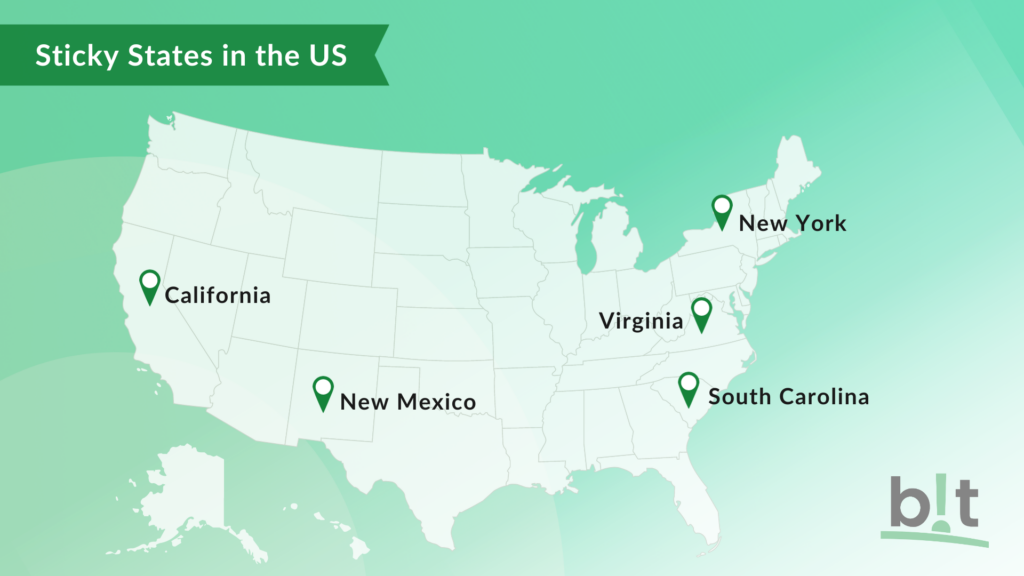Moving abroad is an exciting adventure, but certain details, like determining and possibly changing your state residency for tax purposes, can be less exhilarating.
Even if aspects like these aren’t terribly exciting, though, they are important. Your state residency can have major tax implications, so it’s worth taking the time to read up on it. Fortunately, our team of expat tax experts is here to break this complex topic down for you in an easy-to-understand way.
Continue reading to understand the concept of “sticky states”, how to determine resident taxpayer status, change tax residency, and more.
Key Updates for 2025
- California & New York remain aggressive—sever ties properly to avoid taxes.
- Remote workers may still owe state taxes if earning from a “sticky state.”
- More states are taxing digital nomads—check if your remote work triggers tax residency.
What does it mean if your last state of residency is “sticky”?
Although all US expats who meet the minimum reporting thresholds must file a federal return, they aren’t necessarily on the hook for state taxes. Most states exempt Americans who have moved abroad, as long as they no longer maintain ties like:
- Maintaining a permanent abode
- Retaining significant social ties (e.g. having dependents that live there)
- Retaining significant financial ties (e.g. holding bank/investment/pension accounts based there)
- Owning a valid state driver’s license or other official ID/registration
- Frequently returning to the state or living there for significant periods during the year
- Physically working from the state

In certain states, if the residency definition no longer fits, you can stop filing tax returns. However, if you relocate mid-year, you’d need to file one last part-year resident return. In that case, however, you should still have proof of your move on hand in case of an audit.1
Other states may require you to change your state residency. While most states make this relatively easy, others are considerably more complex. States that pose challenges for transferring residency out are termed “sticky.”
Sticky states

Sticky states for tax purposes include California, New Mexico, New York, South Carolina, and Virginia. These states all define residency in a way that makes it more difficult to prove you no longer maintain ties there. As a result, they may expect you to file a state tax return — and in some cases, even pay state taxes — after you’ve moved.
How to determine state residency for tax purposes
Each state defines tax residency differently. It’s crucial to check the rules specific to your former state. Here are some common criteria:2
- Where you live or maintain a domicile
- Where you work or hold professional ties
- Where you physically spend your time
- Note: Many states classify you as a tax resident if you spend a certain amount of time there (often more than 183 days) in a given tax year
- Where you keep your personal belongings
- Where your immediate family live
How to change state residency for taxes
Fortunately, there are things you can do to either sever ties with your former state or change your residency to a state with more favorable state income tax rates. Again, specific rules vary by state, but taking the following steps — and gathering the relevant documentation as proof if needed — is a good place to start.3
Terminating state residency
In order to terminate your state residency, consider:
- Selling in-state real estate
- Selling your car or any other property registered there
- Limiting how much time you spend in the state each year (typically, less than 183 days)
- Closing financial accounts based there
- Moving all of your belongings (including pets) out of state
- Canceling state-specific IDs, registrations, memberships, and subscriptions
Establishing residency in a new state
In some cases, you may want to establish residency in a new state. This would apply to, for example, a freelancer who wants to maintain a US-registered LLC or someone planning to move to a particular state after spending time abroad. It may also apply to someone who is departing a state that doesn’t consider a foreign country to be a new domicile.
There are multiple methods to establish state residency. Key steps include renting a primary residence in the state or transferring your vehicle registration. Opening a bank account and changing official IDs, including voting registration, are other means of establishing residency.
Other “softer” steps you can take to evidence residency include establishing official connections with local professionals such as a doctor or dentist, becoming affiliated with local social clubs and organizations, and updating your mailing address. Other substantive means of proving state residency status include applying for pet licenses and storing your belongings in the state in which you wish to acquire residency.
Spotlight on: California

While you can’t count on automatically leaving California tax residency behind after a move abroad, it’s certainly not impossible to terminate or change your Californian tax residency status. And since California taxing residents who leave the state (especially those still earning income from California sources) is fairly common, proactivity is key.
California defines tax residents as those who are a) in California for any other reason than temporary stays or transitory purposes or b) domiciled in California.4 Here, domicile refers to a true, fixed, permanent home — i.e. the place they plan on returning, even if they’re away for a while.
To change that domicile, it’s not enough to plan to leave. Instead, you must actively establish a new domicile by a) abandoning your previous domicile, b) physically moving to and residing in a new locality, and c) planning to stay there permanently or indefinitely. (Note that there is a caveat with the third point in that this may be a case where the state doesn’t consider a foreign country to fall within the definition of a new domicile.)
Some extra steps you might want to take to terminate your residency in California include:5
- Filing form 540 NR (if you moved mid-year) and including it in your last state tax return
- Waiting to sell major assets until you’ve established your new residence
- Not returning to California for significant periods of time for at least a few years
- Logging your emails and phone calls to California
- Not voting in California state or local elections
- No longer seeing professionals in California (e.g. doctor, dentist, attorney, etc.)
Spotlight on: New York

In New York, tax residency again depends principally upon whether or not you maintain a domicile in the state (in this case, domicile means primary residence). To change that domicile, you must a) abandon your former domicile and b) change your residence.6
But New York may also consider you a state tax resident even if you don’t maintain a domicile there, particularly if you maintain a permanent abode (i.e. a place of residence, whether it’s primary or not) and spend 184 days or more in the state during the tax year.
Some extra steps you might want to take to terminate your residency in New York include:7
- Filing Form IT-203 (if you moved mid-year) and including it in your last state tax return
- Naming a successor for any New York-based business for which you make significant business decisions
- Establishing a consistent pattern of living outside New York
- Unenrolling your children from New York schools
Considerations when changing state residency
Before changing your state residency, consider that if you intend to return to your former state soon, the official change might not be worth the hassle. Returning quickly might signal to tax authorities that you never truly left, potentially making you liable for taxes during your absence. Additionally, if you own a small business, your business may need to move with you, and former state of residence-sourced income may still require you to file a non-resident state tax return.
FAQs: Changing State Residency for Taxes
-
Do I need to pay state taxes if I live abroad?
It depends on your last state of residence. Most states stop taxing you once you leave, but “sticky states” like California, New York, and Virginia may still claim you as a resident unless you take clear steps to sever ties.
-
How do I prove I no longer live in my former state?
To show you’ve left, you should change your driver’s license, close local bank accounts, sell property, and avoid spending too much time there (often under 183 days). If needed, keep records of your move to defend your status.
-
What if I still earn money from my former state?
Even if you leave, some income—like rental income or business earnings—may still be taxed by your former state. In that case, you may need to file a non-resident state tax return and pay tax on that income.
-
Can I switch my residency to a tax-free state before moving abroad?
Yes, some expats establish residency in tax-free states like Florida, Texas, or Nevada before moving overseas to avoid state taxes. You’ll need to take concrete steps—like renting or buying a home, getting a local driver’s license, and spending time there—to make it official.
-
Does my state consider a foreign country a new domicile?
Not always. Some states won’t recognize a foreign country as a new permanent residence, meaning they could still claim you as a tax resident. This is why establishing residency in a tax-free state first can be helpful.
-
What if I move back to my former state?
If you return within a few years, your old state may argue you never truly left and try to tax you for past years. If you plan to move back soon, changing your residency might not be worth the effort.

 Connect on LinkedIn
Connect on LinkedIn




